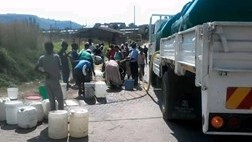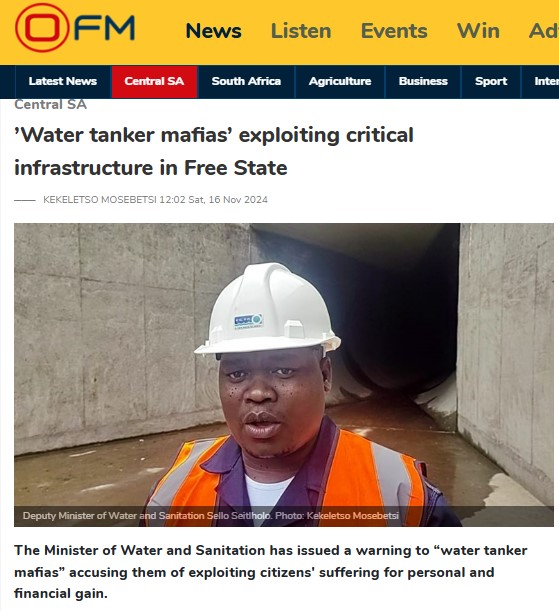Central SA
Maluti-A-Phofung water crisis due to political instability and neglect─── KEKELETSO MOSEBETSI 08:34 Sun, 17 Nov 2024

Years of political instability and municipal neglect have left residents of Maluti-A-Phofung enduring an ongoing water crisis, with outdated infrastructure, rampant vandalism, and corruption exacerbating the situation.
The crisis has sparked outrage from political parties, civil society, and residents who demand accountability and urgent solutions.
For years residents have faced persistent water cuts due to dilapidated water pump stations and infrastructure. According to Moshe Lefuma, the DA Chief Whip in the municipality, interventions by provincial and national governments have failed to yield sustainable solutions. Lefuma criticised the South African Human Rights Commission (SAHRC) for its lack of engagement.
"The water crisis in Maluti-A-Phofung is largely a man-made disaster. With a staggering 70% of water lost due to leakages and outdated infrastructure, residents are paying the price for the municipality’s neglect. Tragically, an elderly gentleman recently lost his life while collecting water from a borehole several kilometers away – a needless tragedy that would not have occurred if the municipality had fulfilled its obligations."
‘Violates basic human rights’
The SAHRC has confirmed the municipality’s water crisis violates basic human rights and pledged follow-up actions to ensure compliance with its findings.
Addressing the media during an inspection of the Lesotho Highlands Water Project's Ash River Outfall, Deputy Minister of Water and Sanitation David Mahlobo acknowledged the severity of the water issues. Mahlobo attributed the collapse of the municipality to poor governance by prior leadership.
“When they collapsed the municipality, we had to intervene in terms of Section 154 and later Section 139. We invested significant funds to build infrastructure, including additional water treatment plants around Harrismith and upgrades to the Fika Patso pump station,” Mahlobo said.
Despite improvements to bulk water systems, Mahlobo highlighted the municipality's inability to maintain its internal water network, resulting in massive leaks and water losses. He urged the municipality to refurbish its systems to reduce leaks and ensure water reaches reservoirs.
The Free State MEC for Cooperative Governance and Traditional Affairs, Saki Mokoena, echoed these sentiments, blaming the water crisis on political instability. However, he assured residents that steps are being taken to stabilise the municipality.
"We will appoint a municipal manager to stabilise administration. There’s an investment of about R1 billion to address services such as roads, sewage, and water systems. Water and electricity supply will be stabilised in the coming months," Mokoena said.
Makhosini Solomon Msibi, Chairperson of the Vaal Central Water Board, revealed previous contractors abandoned water network projects in Qwaqwa, leaving them incomplete despite receiving partial payments. Msibi noted ongoing challenges, including illegal connections, encroachment, and vandalism.
Deputy Minister Sello Seitlholo condemned the so-called “water tanker mafias” for exploiting the crisis for personal gain. He alleged some politicians, municipal officials, and businesses deliberately compromise infrastructure to secure lucrative water tanker tenders.
“Residents continue to suffer because of corruption and greed,” Seitlholo said. Despite promises of reform, residents remain skeptical, with many calling for immediate action to restore basic services.
OFM News/Kekeletso Mosebetsi dg















